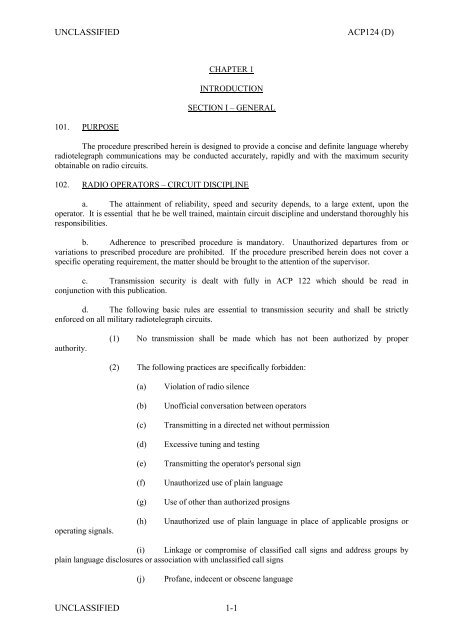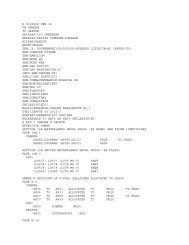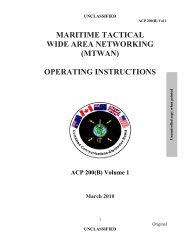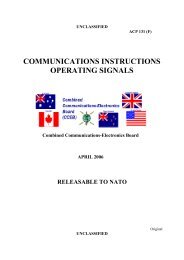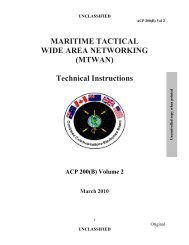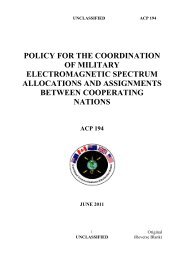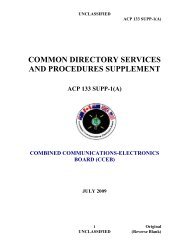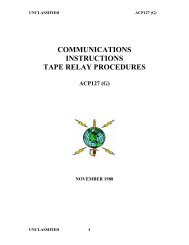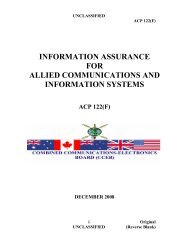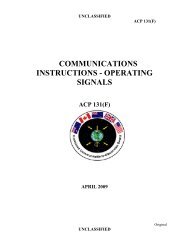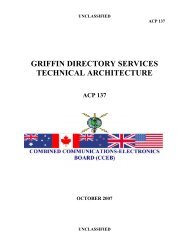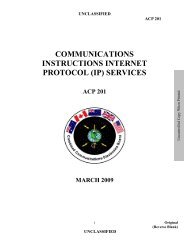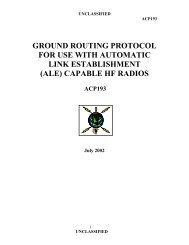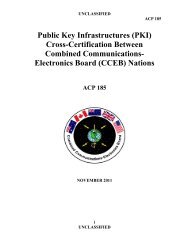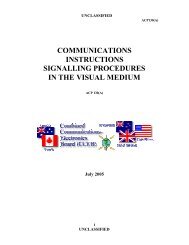communication instructions radio telegraph procedure
communication instructions radio telegraph procedure
communication instructions radio telegraph procedure
You also want an ePaper? Increase the reach of your titles
YUMPU automatically turns print PDFs into web optimized ePapers that Google loves.
UNCLASSIFIED ACP124 (D)<br />
101. PURPOSE<br />
CHAPTER 1<br />
INTRODUCTION<br />
SECTION I – GENERAL<br />
The <strong>procedure</strong> prescribed herein is designed to provide a concise and definite language whereby<br />
<strong>radio</strong><strong>telegraph</strong> <strong>communication</strong>s may be conducted accurately, rapidly and with the maximum security<br />
obtainable on <strong>radio</strong> circuits.<br />
102. RADIO OPERATORS – CIRCUIT DISCIPLINE<br />
a. The attainment of reliability, speed and security depends, to a large extent, upon the<br />
operator. It is essential that he be well trained, maintain circuit discipline and understand thoroughly his<br />
responsibilities.<br />
b. Adherence to prescribed <strong>procedure</strong> is mandatory. Unauthorized departures from or<br />
variations to prescribed <strong>procedure</strong> are prohibited. If the <strong>procedure</strong> prescribed herein does not cover a<br />
specific operating requirement, the matter should be brought to the attention of the supervisor.<br />
c. Transmission security is dealt with fully in ACP 122 which should be read in<br />
conjunction with this publication.<br />
d. The following basic rules are essential to transmission security and shall be strictly<br />
enforced on all military <strong>radio</strong><strong>telegraph</strong> circuits.<br />
authority.<br />
operating signals.<br />
(1) No transmission shall be made which has not been authorized by proper<br />
(2) The following practices are specifically forbidden:<br />
(a) Violation of <strong>radio</strong> silence<br />
(b) Unofficial conversation between operators<br />
(c) Transmitting in a directed net without permission<br />
(d) Excessive tuning and testing<br />
(e) Transmitting the operator's personal sign<br />
(f) Unauthorized use of plain language<br />
(g) Use of other than authorized prosigns<br />
(h) Unauthorized use of plain language in place of applicable prosigns or<br />
(i) Linkage or compromise of classified call signs and address groups by<br />
plain language disclosures or association with unclassified call signs<br />
(j) Profane, indecent or obscene language<br />
UNCLASSIFIED 1-1


